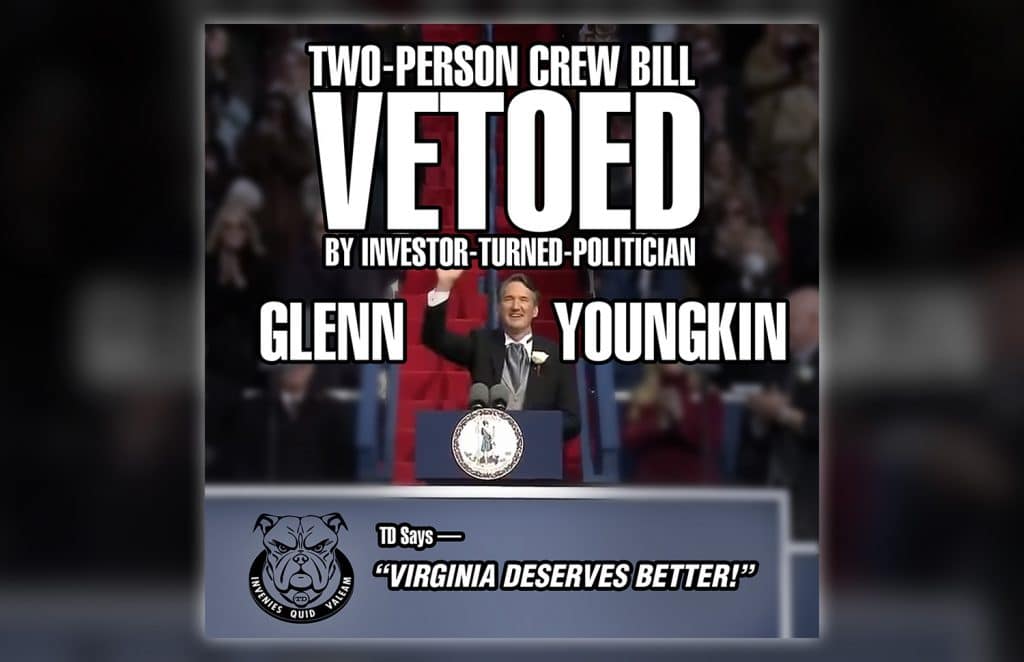
As the clock was running out for him to act Friday night, Virginia Gov. Glenn Youngkin decided he was against public safety, common sense and protecting Virginia railroad workers’ jobs and pensions. He vetoed a bill that required a minimum two-person crew on Virginia’s freight trains. Fortunately, the clock is also running out on his term as Governor.
An irresponsible choice
Both a certified conductor and an engineer are required to safely operate a long train responsibly, although railroads would like to find ways to eliminate one or both positions over time. SMART-TD is fighting to protect responsible crew sizes across the United States. Conductors are often the first people on site when there is an accident or derailment, and they often monitor the track or train while the engineer operates the engine. A two-person job requires a two-person crew (2PC).
As the rhetoric heats up this election year, conductors and other SMART-TD members are putting practical results ahead of their political party. Transportation workers throughout the country are watching to determine whether a politician is with us, or against us.
Rather than keeping his constituents safe and his state’s economy running, Youngkin placed more value in big business and the campaign dollars railroads can deposit in his political piggybank.
Make no mistake: Gov. Youngkin and those who chose not to support the two-person crew bill in Virginia are acting AGAINST us!
It’s not about party
In recent years, SMART-TD Virginia State Legislative Director (SLD) Ronnie Hobbs has worked with legislators along the political spectrum to advance our 2PC bill. Brother Hobbs and his team got 2PC (Senate Bill 143) through both chambers and the joint conference committee. Regrettably, Youngkin decided to reject the work of both parties when he used his veto power to reward railroad shareholders when he should have protected his citizens.
“I want to thank all of the legislators in this state for the time they took to learn about the role of freight conductors in Virginia,” Hobbs said. “We have found so many great partners and allies in this process of making the case for 2PC. I want to thank Delegate Shelly Simonds and Senator Jennifer Carroll Foy for sponsoring our legislation and championing our members’ cause from beginning to end. Most importantly, I’d like to thank them for their continued interest in our cause, which goes beyond this ill-advised veto.”
The fight for Virginia crews continues in 2025
Though disappointed, Hobbs and his powerful team of Virginia allies are still in the fight, with an eye on the 2025 election.
Abigail Spanberger, a member of Congress, is running for governor. Spanberger has sponsored federal action on 2PC in every legislative session since 2018, proving she is interested in our issues and sees value in our work. Spanberger’s ACTIONS demonstrate that she is 100% with us in our pursuit of a minimum crew size.
“I want to personally thank every member of SMART here in Virginia, who took the time and effort to contact their legislators and come to the hearings,” Hobbs said. “The tremendous effort made by you and your friends/family was noticed, and you were heard. Unfortunately, Gov. Youngkin was too busy listening to Wall Street to pay attention.”
More help will be needed in 2025 and beyond. With Youngkin’s departure, Spanberger in the governorship and the Virginia members rallying support in the Legislature, Virginia will join our growing number of 2PC states. When we win enough states, SMART-TD will have won the nation.
Related News
- Senate Strikes Down Spending Bill’s Harmful AI Provision
- Razor blade found on brake wheel
- Coming Soon: SMART-TD Voluntary Income & Life Protection (VILP) Program
- Senate Passes Tax Bill Without Including Railroaders
- SMART-TD Honors the Retirement of Brother Greg Hynes: A Visionary, a Fighter, and a Legend
- SMART-TD Calls on U.S. Senate to Support the Cantwell Amendment and Protect Rail Workers
- Yardmaster Protection Act Introduced
- PHOTO GALLERY: 2025 Denver Regional Training Seminar
- Fighting for Stronger Heat Protections for Rail Workers
- Regional Training Seminar Sets (Mile-High) Record in Denver